
Hannibal Hamlin was the 15th vice president of the United States, serving from 1861 to 1865, during President Abraham Lincoln's first term. He was the first Republican vice president.

The National Statuary Hall is a chamber in the United States Capitol devoted to sculptures of prominent Americans. The hall, also known as the Old Hall of the House, is a large, two-story, semicircular room with a second story gallery along the curved perimeter. It is located immediately south of the Rotunda. The meeting place of the U.S. House of Representatives for nearly 50 years (1807–1857), after a few years of disuse it was repurposed as a statuary hall in 1864; this is when the National Statuary Hall Collection was established. By 1933, the collection had outgrown this single room, and a number of statues are placed elsewhere within the Capitol.

Franklin Bachelder Simmons was a prominent American sculptor of the nineteenth century. Three of his statues are in the National Statuary Hall Collection, three of his busts are in the United States Senate Vice Presidential Bust Collection, and his statue of Ulysses S. Grant is in the United States Capitol Rotunda.

Charles Eugene Tefft was an American sculptor born in Brewer, Maine. His statue of Hannibal Hamlin is one of Maine's two statues in the National Statuary Hall Collection located in the US Capitol in Washington D.C. A second Tefft statue of Hamlin stands in Norumbega Mall in downtown Bangor, Maine.

Joseph Wheeler is a bronze sculpture commemorating the Confederate and American military commander and politician of the same name by Berthold Nebel, installed in the United States Capitol as part of the National Statuary Hall Collection. The statue was gifted by the state of Alabama in 1925.
Charles Brantley Aycock is a bronze sculpture depicting the American politician of the same name by Charles Keck, installed in the United States Capitol's crypt as part of the National Statuary Hall Collection. The statue was gifted by the U.S. state of North Carolina in 1932.

John Burke is a bronze sculpture depicting the American politician of the same name by Avard Fairbanks, installed at the United States Capitol's National Statuary Hall, in Washington, D.C., as part of the National Statuary Hall Collection. The statue was gifted by the U.S. state of North Dakota in 1963.
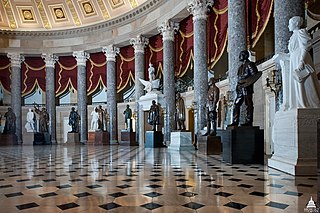
The National Statuary Hall Collection holds statues donated by each of the United States, portraying notable persons in the histories of the respective states. Displayed in the National Statuary Hall and other parts of the United States Capitol in Washington, D.C., the collection includes two statues from each state, except for Virginia which currently has one, making a total of 99.

A bronze statue of Charles Carroll of Carrollton by Richard E. Brooks is installed in the crypt of the United States Capitol, in Washington, D.C., as part of the National Statuary Hall Collection. It was gifted by the U.S. state of Maryland in 1903.

Henry Clay is a 1929 bronze sculpture by Charles Henry Niehaus depicting the lawyer and politician Henry Clay, installed in the United States Capitol in Washington D.C. as part of the National Statuary Hall Collection. It is one of two statues donated by the state of Kentucky. The statue was accepted into the collection by Virgil Chapman on March 3, 1929.
Huey Long is a 1941 bronze sculpture of Huey Long by Charles Keck, installed in the United States Capitol, in Washington, D.C., as part of the National Statuary Hall Collection. It is one of two statues donated by the state of Louisiana.

Andrew Jackson is a 1928 bronze sculpture of Andrew Jackson by Belle Kinney Scholz and Leopold Scholz, installed in the United States Capitol, in Washington D.C., as part of the National Statuary Hall Collection. It is one of two statues donated by the state of Tennessee. The statue was accepted into the collection by Senator Kenneth McKellar on April 16, 1928.

John James Ingalls is a 1905 marble sculpture of the politician of the same name by Charles Henry Niehaus, formerly installed in the United States Capitol, in Washington, D.C., as part of the National Statuary Hall Collection. It was one of two statues donated by the state of Kansas. The statue was accepted in the collection by Senator Arthur P. Gorman on January 21, 1905. On July 27, 2022, it was replaced by a Statue of Amelia Earhart.

William King is an 1878 marble sculpture depicting Maine's first governor of the same name by Franklin Simmons, installed in the United States Capitol, in Washington, D.C., as part of the National Statuary Hall Collection. It is one of two statues donated by the state of Maine. The statue was accepted in the collection by Senator Hannibal Hamlin and Senator James G. Blaine on January 22, 1878, who rhapsodized upon the occasion, “He restrained the wrath of the impudent, quickened the zeal of the laggard, dissipated the fears of the doubting and molded his adherents and followers into a compact, cooperative, effective force. .. . He, more than any other man created the State of Maine.”
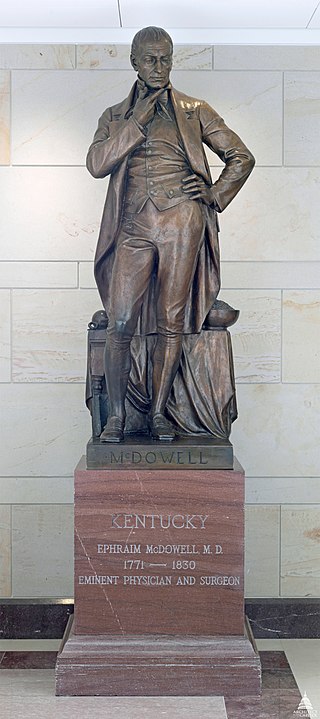
Ephraim McDowell is a bronze sculpture depicting the American physician and surgeon of the same name by Charles Henry Niehaus, installed in the United States Capitol Visitor Center, in Washington, D.C., as part of the National Statuary Hall Collection. The statue was gifted by the U.S. state of Kentucky in 1929.
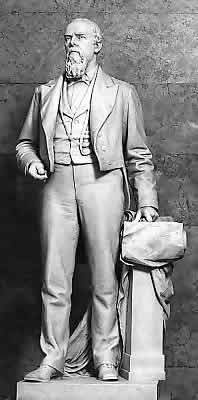
Oliver P. Morton is a 1900 marble statue of Governor Oliver P. Morton by Charles Henry Niehaus installed in the United States Capitol, in Washington, D.C., as part of the National Statuary Hall Collection. It is one of two statues donated by the state of Indiana. The statue was accepted into the collection on April 14, 1900, by Indiana Senator Albert J. Beveridge.
Francis Harrison Pierpont is a 1910 marble sculpture of Francis Harrison Pierpont by Franklin Simmons installed in the United States Capitol, in Washington, D.C., as part of the National Statuary Hall Collection. It is one of two statues donated by the state of West Virginia. The sculpture was unveiled by the Hon. Thomas Condit Miller, on April 27, 1937.
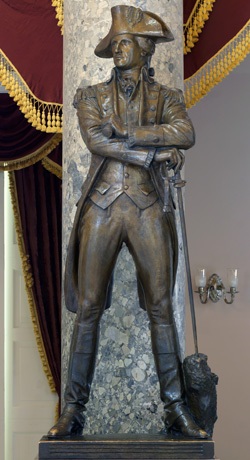
John Sevier is a bronze sculpture depicting the American politician of the same name by Belle Kinney and Leopold Scholz, installed in the United States Capitol's National Statuary Hall, in Washington, D.C., as part of the National Statuary Hall Collection. The statue was gifted by the U.S. state of Tennessee in 1931.
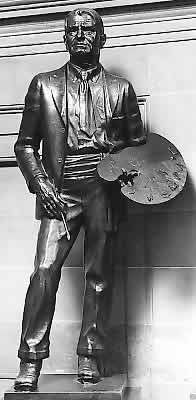
Charles Marion Russell is a sculpture depicting the American artist of the same name by John Weaver.

The United States Capitol displays public artworks by a variety of artists, including the National Statuary Hall Collection and United States Senate Vice Presidential Bust Collection.















